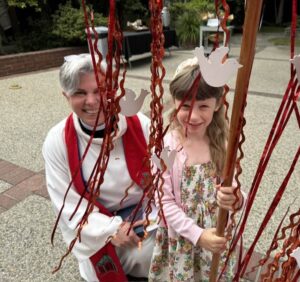 For eight of the last nine years, this has been my view as presiding officer at our annual Episcopal Diocese of Los Angeles convention. In 2020, we zoomed instead of roomed. So I led by laptop, using whatever light happened to be in the Great Hall at St. Paul’s Commons, Echo Park. My mother’s friend and mine, the late Canon Lydia Lopez, speaking the truth in love according to her lifelong example, told me that I had looked ill and that if we ever did that again, I had better wear makeup.
For eight of the last nine years, this has been my view as presiding officer at our annual Episcopal Diocese of Los Angeles convention. In 2020, we zoomed instead of roomed. So I led by laptop, using whatever light happened to be in the Great Hall at St. Paul’s Commons, Echo Park. My mother’s friend and mine, the late Canon Lydia Lopez, speaking the truth in love according to her lifelong example, told me that I had looked ill and that if we ever did that again, I had better wear makeup.
Taking up the gavel for the first time in 2017 worried me considerably. Presiding for bishop’s committee or even Diocesan Council meetings is one thing. A collective of 700 at first struck me as a far more daunting category. I’d seen bishops do it with aplomb, notwithstanding understandable moments of irritation or confusion at sudden agenda changes, amendments of amendments to alternate resolutions, and challenges from the floor.
My respect for able forebears increased with each of my nine conventions along with, bit by bit, my confidence. And yet the insecure temperament awaits the day everything goes south. This Friday and Saturday, as we elected our gifted, gracious eighth bishop, the Rev. Dr. Antonio Gallardo, who will take office July 11, counting votes, for his office and others, was the main source of procedural anxiety.
 We’ve been doing it electronically since 2018. Our judge of elections, Canon Patti Jo Ramsey, a renowned Superior Court judge in her free time, is a colossus of steely competence. But handheld voting devices can be persnickety. The reality of user error does not mean they are perfect. Thanks to the foresight of convention coordinator Samantha Wylie, we had the option of switching to paper ballots. But that would have risked chaos and probably sent us to Pasadena for a third day of convention on Sunday.
We’ve been doing it electronically since 2018. Our judge of elections, Canon Patti Jo Ramsey, a renowned Superior Court judge in her free time, is a colossus of steely competence. But handheld voting devices can be persnickety. The reality of user error does not mean they are perfect. Thanks to the foresight of convention coordinator Samantha Wylie, we had the option of switching to paper ballots. But that would have risked chaos and probably sent us to Pasadena for a third day of convention on Sunday.
A tremor of anxiety in our consultative circle threatened to push us in that direction. But Canon Ramsey had faith in her equipment and team. We could tell convention did as well. Her predecessor, Canon J Roger Leachman, asked to be recognized and gently acknowledged the reality of user error by reminding us of the mess we used to make of our paper ballots in his day. We tested and retested, counted and recounted, and finally decided to go forth digitally. The spirits of Christ and Patti Jo did their thing. Concerns about the technology receded. We were on that question finally of one body. We ended convention on time.
I reckon the experience as another example of my vocation continuing to be my education. Perhaps others can sympathize. Many go through life thinking the world can’t wait for us to fail. And yet by grace, we learn that in most cases, people want us to succeed, as long as they know we’re listening, learning, and doing the best we can.
It may be the most vital leadership lesson of all. It’s one of many reasons I’m grateful for the blessing of working these nine years with the Rev. Canon Melissa McCarthy, my canon to the ordinary and our diocesan chief of staff. The only reason I can articulate the lesson so confidently is that, in crisis after crisis, amid dilemma after dilemma, she has taught it to me. I describe it by reclaiming the term McCarthyism from its dismal historical associations. In Melissa’s case, it means the gospel opposite of what it once did. It means finding a good and holy way forward while leaving no one behind.
(Photo: Melissa with our granddaughter Harriet)
